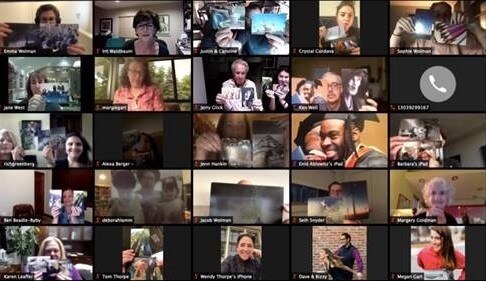As we begin a new year with renewed hopes for a brighter future, it is the perfect time to initiate an intentional conversation with everyone in your family about your shared values and unique perspectives, and to discuss your collective philanthropic priorities at this critical moment and beyond.
In late 2020, Sharna Goldseker, founder and vice president of 21/64, a nonprofit that provides multigenerational advising and next-generation engagement within family philanthropy, joined five generations of Rose Community Foundation fundholders (traditionalist to Generation Z) for a virtual conversation about multigenerational philanthropy. The discussion highlighted the unique attitudes and tendencies of different generations of donors and offered insights into how multigenerational family giving can be strengthened by the unique perspectives that each generation brings to the table.
Differing philanthropic approaches across generations
Sharna shared data illustrating that people from different generations often have different perspectives on giving. Even within a family, she explained, “each generation tends to have different motivations for giving and different strategies for maximizing philanthropic impact.”
According to Sharna, next-generation philanthropic involvement is beginning at a younger age, and new generations of funders are approaching philanthropy in fresh and innovative ways. Though the causes that “next-gen” donors support have not changed significantly from those supported by their parents and grandparents – basic needs, education and poverty reduction remain key issues – they are more likely than previous generations to develop trust-based relationships with grantees, conduct due diligence to identify strategies that will make an impact and measure results to pivot when needed.
“Whereas next-gen donors perceive their parents to be most motivated by a sense of communal responsibility, next-gen donors are principally motivated by values and impact,” Sharna said. “If they are passionate about education, for example, they aren’t just donating to their alma mater. Across issue areas, they are leveraging all their philanthropic resources – from making donations to volunteering their time to leveraging their professional or academic expertise and their networks – to strategically and sustainably support the causes they care about.”
One way this has manifested is in increased pooled funding among younger donors who recognize that by giving together they can make a greater difference. Young people are increasingly forming values-driven giving circles – philanthropic groups comprised of goal-aligned peers that give collaboratively to causes they are passionate about. Rose Community Foundation facilitates giving circles for Jewish teenagers and young adults, and encourages young people of all backgrounds and means to consider starting one of their own. For inspiration, look to Sandy Goldstein, a 15-year-old Rose Youth Foundation member who created his own racial justice giving circle with a group of friends in the summer of 2020.
Insights on philanthropic collaboration
Even within families, Sharna shared, the distinct perspectives of individuals from different generations can sometimes be challenging to negotiate. It is not uncommon for families to at one point or another have trouble finding alignment across generations about which causes to support and how to go about funding them.
“It can be hard for older folks to articulate to their kids what they want their legacy to be, just as it can be hard for younger folks to consider what they want their legacy to be with so much of their life ahead,” Sharna explained. “Often we find that differences between family members have less to do with a lack of shared values and more to do with how each generation’s values are implemented through grantmaking.”
For families who have struggled to get on the same philanthropic wavelength, Sharna encouraged open discussion between generations about personal and familial narratives.
“Storytelling is so important,” she said. “So often, parents and grandparents are reluctant to talk about their family’s story – the highs and the lows – with the next generation. If you can share the choices you’ve made and how you’ve navigated challenges, it helps the next generation see themselves as resilient and able to navigate highs and lows too. It also helps the next generation feel they are part of the family’s multigenerational story and increases buy-in to giving as a family.”
“At Rose Community Foundation, we have seen that when there is clarity around family values and individual values, there’s more joy and confidence in donor grantmaking,” added Anita Wesley, the Foundation’s senior philanthropy advisor. “Having that mutual understanding helps everyone feel better about giving together.”
Coming together through family giving
This has been a year of extraordinary needs and converging crises facing our region, and Rose Community Foundation donors have dramatically stepped up their giving in response. The scale and scope of their philanthropic response to the COVID-19 pandemic and longstanding racial injustices has been truly inspiring.
“This time of unprecedented needs also creates unprecedented opportunities to fund innovative and vitally important nonprofit work and to have new conversations with those we are closest to about what matters most and how we can come together to help our communities,” says Sarah Indyk, Rose Community Foundation’s vice president of philanthropic services. “Our philanthropic services team is skilled in facilitating these conversations across the generations, even virtually, and helping philanthropic families work together to articulate and pursue their charitable goals.”
If you are interested in learning more about the advantages of opening a donor-advised fund at Rose Community Foundation, please email Sarah Indyk, vice president of philanthropic services.

